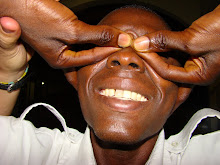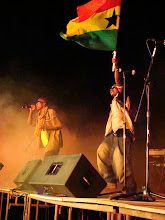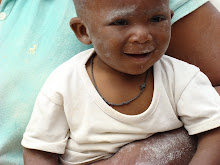 KUMASI, Ghana___ A refuge from the frenetic pace of city life, St. Peter’s Cathedral Basilica boasts a regal extravagance, beckoning pedestrians with open doors. Drums beat a rhythmic welcome, as the voices of the choir and smell of incense fill this spacious haven.
KUMASI, Ghana___ A refuge from the frenetic pace of city life, St. Peter’s Cathedral Basilica boasts a regal extravagance, beckoning pedestrians with open doors. Drums beat a rhythmic welcome, as the voices of the choir and smell of incense fill this spacious haven.Sheltering its finely clad occupants from the downpour outside, the cathedral melds Asante tradition with European Catholicism. Stained glass windows bear Asante symbols such as gye nyame, signifying acceptance for God, and a bronze statue of the Virgin Mary is prominently poised, her infant held high. Hundreds of crosses stand painted on the walls, in the windows, and even in the very structure of the cathedral itself - a massive crucifix.
Church leaders also exhibit this cultural blending. A meticulously dressed conductor is clothed in a radiant silver tie and shiny black suit, with a blue robe adorned in Kente patterned stripes running the length of its interior trim. Red wire-rimmed glasses and a closely trimmed crew cut accentuate his intellectual air. Between songs he wipes his face neatly with a handkerchief while his right hand remains elegantly poised, grasping a slight wand.
The all-male choir’s melodies are transfixing, interspersed with lengthy sermons on Samson’s desire for wisdom. Speaking in rapid Twi, Reverend Francis encourages the congregation to strive for knowledge in the afterlife, at times ascending into song and chant.
A female church elder walks deliberately down the aisle, commanding respect. Surveying the choir, she comes upon a dormant man and taps the wooden pew on which his head is resting.
The room is cloaked in order. Women listen attentively, many sport straightened hair or traditional head wraps, with perfectly pressed shirts and shiny shoes.
Thomas Agyemang and James Boateng, each 20 years old, agree that wealth is a common factor in the Cathedral. “Everybody gives the collection,” Thomas states.
The most prominent church in the royal city of Kumasi, St. Peter’s is a bastion of bounty.















































